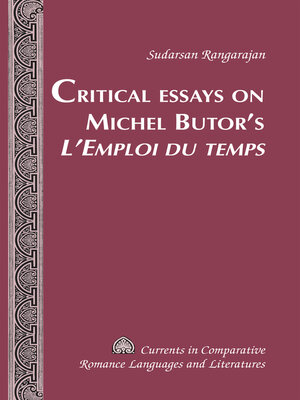Critical Essays on Michel Butors «LEmploi du temps»
ebook ∣ Currents In Comparative Romance Languages and Literatures
By Tamara Alvarez-Detrell

Sign up to save your library
With an OverDrive account, you can save your favorite libraries for at-a-glance information about availability. Find out more about OverDrive accounts.
Find this title in Libby, the library reading app by OverDrive.



Search for a digital library with this title
Title found at these libraries:
| Library Name | Distance |
|---|---|
| Loading... |
Michel Butor, one of the earliest exponents of the French New Novel, is known for experimenting with narrative voice (the second-person narration in La Modification), focalization (the changes in narrative perspective in Degrés), and the treatment of genres (L'Emploi du temps).
L'Emploi du temps (1956) is a quintessential nouveau roman for it is about a novel within a novel. In Critical Essays on Michel Butor's L'Emploi du temps, Sudarsan Rangarajan examines the different aspects of the novel from a postmodern perspective. Engaging contemporary theorists – Sartre, Foucault, de Man, and Prince among others – the essays encompass diverse areas: narratology, rhetoric, genre studies, existentialism, and postcolonialism. From the analysis of the beginnings and the function of narratees to the study of rhetoric, the journalistic discourse, the hybridization of the detective and the Gothic genres, the figure of the flâneur, and postcolonialist concepts (the elite and the subaltern), the essays provide new insights into one of the greatest twentieth-century novels.
L'Emploi du temps (1956) is a quintessential nouveau roman for it is about a novel within a novel. In Critical Essays on Michel Butor's L'Emploi du temps, Sudarsan Rangarajan examines the different aspects of the novel from a postmodern perspective. Engaging contemporary theorists – Sartre, Foucault, de Man, and Prince among others – the essays encompass diverse areas: narratology, rhetoric, genre studies, existentialism, and postcolonialism. From the analysis of the beginnings and the function of narratees to the study of rhetoric, the journalistic discourse, the hybridization of the detective and the Gothic genres, the figure of the flâneur, and postcolonialist concepts (the elite and the subaltern), the essays provide new insights into one of the greatest twentieth-century novels.







